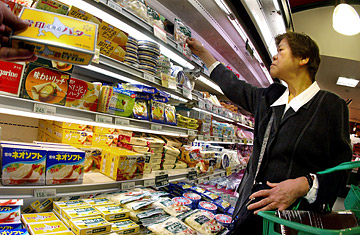
A woman buys butter at a supermarket in Tokyo, Japan.
The world's second largest economy is now crying over spilled milk — and its delicious by-product, butter. Japan, insulated from rice shortages that plague other parts of Asia, is experiencing an unprecedented shortage of the household staple — and discovering that it is not as immune from the growing global food crisis as it wants to be.
Butter has a strange status in Japan. Historically, butter is a reminder of Japan's first contacts with the West — the islanders complained that the foreigners were bata-kusai , that is, "butter-stinkers." But since the 1960s, local butter making and consumption has been seen as a symbol of Japanese self-sufficiency in and mastery of an originally Western product. The shortage is a blow to that independent self-image.
The butter shortage results from a chain of events. When the country suffered an overproduction of milk in 2006, the government ordered about 1,000 tons of raw milk poured down the drain and dairy cows slaughtered to prop up prices and defend local milk farmers. Dairy prices were then managed to retain their advantage to imported milk and butter, whose prices were inflated by tariffs. (To protect domestic butter, the tax on imported butter went up twice last year. There is a nearly 30% tariff on butter imports.)
But now grain-feed prices have risen as a result of a drought in Australia as well as the accompanying use of corn for ethanol, which has reduced the amount available for feed for Japan's cows. The drought has also cut back on milk that would have been imported to supplement the Japanese market. Combined with competing demand for milk and milk products from emerging markets in China and Russia, the result is a collapse of the local butter production in Japan.
Not that there is no butter in Japan. It's just expensive because of the tariffs imposed on imports. At a popular international supermarket in Tokyo, Nissin, consumers are complaining because they no longer have access to butter that costs 500 yen ($5) for 250 grams, produced in Hokkaido, the center of Japan's milk industry. Instead, they are confronted with an abundance of French butter, costing upwards of 2,000 yen ($20) for 200 grams. "Even if we order 100 or 200 packages of domestic butter," says Nissin's dairy buyer Katsuhiro Maruyama, "only about six or so actually get delivered — if any at all." Some stores with a limited supply have already started rationing one domestic butter product per customer, because shipments are erratic at best. Needless to say, margarine sales have gone up and stores without domestically produced butter have posted signs of apology over empty refrigerator shelves.
In the meantime, prices for Japanese butter are going up and the government announced that Japan may need "emergency" butter imports, A government-backed body would then purchase butter at a lower tariff.
